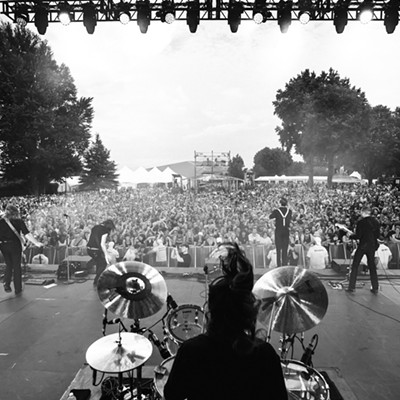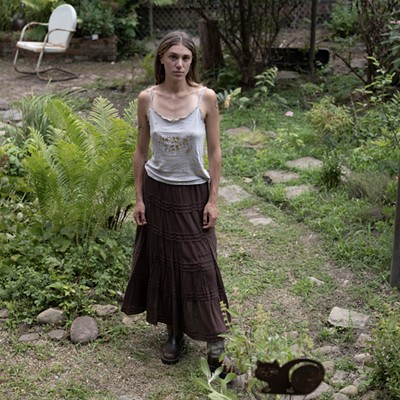Since the release of its debut, in 1997, Deerhoof hasn’t gone more than two years without putting out music. There’s something antsy about that schedule, which fits in nicely with the band’s overall vibe of controlled chaos, of being unpredictable but consistent. From its noise-rock roots of the late ’90s to the transcendent, experimental pop of recent albums like 2014’s La Isla Bonita and 2016’s The Magic, Deerhoof has always been surefooted, relentless and open to new things. So, it shouldn’t have surprised anyone when, earlier this year, the band jumped the gun and released its 14th LP, Mountain Moves, two weeks ahead of schedule, and only 15 months after The Magic.
As guitarist John Dietrich explained via email from the road, the quick turnaround and early release stem from the band’s self-imposed hectic schedule and the members’ propensity for grassroots political activism.
In December 2016, the record label Joyful Noise asked Deerhoof to be its 2017 Artist in Residence, an annual series in which one group or artist curates and repackages past works and creates new ones for limited release late in the year.
For Deerhoof, the goal was a boxed set of LPs and special releases, a personal signed letter from the group and, finally, the release of Mountain Moves in September. From writing and recording to publication, the album took three months. Many of the songs were already partially written, but still, that’s a pretty remarkable turnaround.
The album was set for a Sept. 8 release, but the band decided to put it out two weeks prior. Mountain Moves was posted on its Bandcamp on Aug. 28 with a pay-what-you-want price, with all proceeds earned until Sept. 7 going to the Emergent Fund.
According to its website, the nonprofit Emergent Fund focuses on “grassroots organizations in communities of color who are facing injustice based on racial, ethnic, religious and other forms of discrimination” and works to “provide resources to defend against what’s coming, and to develop innovative strategies to transform our country.”
“You could say we’re giving our Bandcamp proceeds to ‘charity,’ but we don’t really see The Emergent Fund as a charity,” the band posted on Facebook on Sept. 4. “Isn’t charity another way of maintaining hierarchy, instead of undermining it? The Emergent Fund is a pooling of resources among equals for the purpose of mutual aid. Their mission and reputation impressed us enough to entrust them with deciding where need is greatest at any moment, in this time of ever-shifting threats.”
While Mountain Moves has all the joyful erratic charisma of Deerhoof’s earlier albums, something feels different here. It might be the quick turnaround, but there are more concrete changes to point to. With more covers and guest spots than on previous records, and the involvement of the Emergent Fund, this feels like the most direct political statement of the band’s career.
On “Come Down Here And Say That” (featuring Stereolab’s Laetitia Sadier), you’ll hear vocalist/bassist Satomi Matsuzaki’s trademark idiomatic lyricism, but there’s something heavier at play. The title is a reference to a line Bob Dylan used against hecklers during his famous pivot-to-electric tour, though the band flipped it from “come up here” to “come down” as a nod to the power struggles in play at this current political moment.
The involvement of politically outspoken artists like Sadier, too, highlights how this record sounds different. That collaboration was born out of a chance meeting when Dietrich’s other band, Powerdove, played a show with Sadier a couple years ago.
“I’ve been a Stereolab fan for a long time but wasn’t familiar with [Sadier’s] newer material, so it was somewhat shocking to see in this very stripped-down format,” wrote Dietrich. “When we were discussing possible collaborators for the album, I immediately thought of her as she’s so vocal with her political views, and we thought, ‘What better person to ask to be involved?’”
With the covers and handful of collaborators on this record, including Wye Oak’s Jenn Wasner and the Argentinian singer Juana Molina, there’s a refreshing feeling of renewed purpose and sense of community on Mountain Moves. It’s likely a product of the times, as the group is often outspoken in its opposition to the current presidential administration and was an avid supporter of Bernie Sanders’ candidacy.
The politics of it makes for a good headline, but the songs on Mountain Moves have all the charming, fun and bizarre characteristics of classic Deerhoof. Deerhoof seems incapable of standing still, but its output remains idiosyncratic and easy to recognize. It does what it does and has no plans to stop.
Interviews with the group almost always inquire into the band’s seemingly endless supply of inspiration, and the palpable sense that the members still like each other, and making music together, after all these years.
Asked to describe his playing relationship with Deerhoof’s other longest-running guitarist, Ed Rodriguez, Dietrich wrote, “I strongly dislike Ed, but we manage to work things out in a cordial manner. As for how our styles differ, it’s hard to say as we’ve been playing together for so long. We’ve bled into each other a bit. He’s definitely got more theory and training and stuff than I do and is technically capable of playing faster/better/cooler than I can. I hate him.”
That’s Deerhoof: playful, funny, poignant and honest.

















